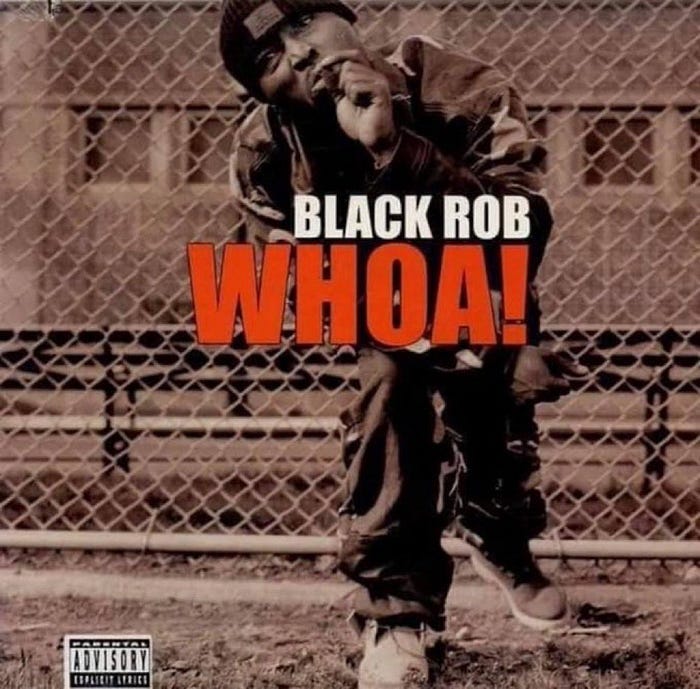Black Rob’s Life Story: A Milestone in Hip-Hop History and Authentic Storytelling
Happy 25th Anniversary, Life Story!
Today marks the 25th anniversary of the late Black Rob’s first rap studio album, Life Story. Released through Arista Records and Sean “Puffy” Combs’s Bad Boy Entertainment, the album debuted at number 3 on the Billboard 200, selling nearly 178,000 copies in its first week. It produced two singles: “Whoa!” and “Espacio.”
Critics praised the album for its production, as well as Black Rob’s vocal presence and lyricism, which drew comparisons to the late Notorious B.I.G. Roxanne Blanford of AllMusic highlighted Black Rob’s vocal delivery, calling it reminiscent of the “smooth, reserved style” of the Notorious B.I.G. She noted his ability to “construct explicit tales with hooks you can feel and lyrics that stick,” concluding that with 20 powerful tracks, Black Rob’s debut might help Puff Daddy regain some of the street credibility lost when Sean Combs achieved mainstream success.
Vibe contributor Miguel Burke also commended Rob for his skill in crafting graphic, autobiographical narratives. However, he pointed out some negatives, such as Puff’s “irritating ad-libs” on “Make It Hot” and his “wannabe-rough rhymes” on “Down the Line.” Despite these criticisms, Burke concluded that Life Story “is a breath of fresh air” even as it delves into gritty themes.
Life Story’s Cultural Impact
Black Rob’s Life Story album has had a significant cultural impact within the hip-hop community and beyond. The album cemented Black Rob’s place in the genre, showcasing his distinctive style and storytelling ability. It introduced listeners to Black Rob’s unique voice and placed him within the lineage of influential East Coast rappers, drawing comparisons to legends like the Notorious B.I.G.
The lead single, “Whoa!” became an anthem characterized by its catchy hook and relatable subject matter. Its infectious rhythm helped it gain mainstream traction and retain street credibility, demonstrating how hip-hop could resonate with commercial audiences and hardcore fans and foster a sense of inclusivity and community within the genre. The song’s impact extended beyond radio play; it has been sampled and referenced in various cultural contexts, solidifying its place in hip-hop history.
Critics recognized Life Story for its raw, autobiographical storytelling, which authentically captured the realities of urban life. This deep resonance with listeners who appreciated genuine narratives over more polished mainstream productions made the album a powerful tool for connecting and understanding the experiences of many. The album’s willingness to grapple with themes of struggle, ambition, and resilience in the face of adversity further enhanced this sense of connection.
In the broader scope of hip-hop, Life Story represents a pivotal moment when artists like Black Rob were carving out their identities in an industry increasingly dominated by larger-than-life figures like Puffy and Jay-Z. The album helped equip younger generations to tell their stories authentically. It inspired artists who sought to blend personal narratives with broader societal issues, offering a hopeful glimpse into the genre’s future.
The collaboration with Bad Boy Entertainment highlighted a transitional phase in hip-hop during the late ‘90s, where artists frequently intertwined commercial success with their artistic authenticity. By successfully merging these elements, Life Story remains a reference point in discussions about the balance between street credibility and mainstream appeal.
Overall, Black Rob’s Life Story showcased his talent and contributed to shaping hip-hop culture, echoing the voices of those often marginalized in the genre’s larger narrative. Its enduring legacy continues to influence new artists and engage long-time hip-hop fans.
Life Story’s Legacy
The album’s legacy stems from its raw, autobiographical storytelling, which authentically captures the realities of urban life and resonates deeply with listeners. Tracks like “Whoa!” became anthems, balancing catchy hooks and relatable narratives. This allowed them to bridge the gap between mainstream appeal and street credibility. Their ability to craft infectious yet poignant music demonstrated how hip-hop could be commercially successful and culturally relevant.
Moreover, Life Story contributed to the culture by opening doors for future artists to share their personal experiences. Black Rob’s work encouraged a wave of storytellers who emphasized authenticity over polished production, reminding the industry of the importance of genuine narratives. His collaboration with Bad Boy Entertainment during a transitional phase in hip-hop highlighted the tension between commercial success and artistic integrity, illustrating that both could coexist.
The album’s influence extends beyond its initial release, leaving a lasting mark on hip-hop culture. Life Story encouraged new generations to weave their life stories into their music, opening doors for future artists to share their personal experiences. Its legacy is also evident in how it inspires discussions about street credibility and mainstream success in hip-hop.
In summary, Black Rob’s Life Story showcased his talent and played a crucial role in shaping hip-hop culture. The album amplified the voices of those often overlooked in the genre’s broader narrative. Its impact and relevance resonate with long-time fans and emerging artists, solidifying its place in hip-hop history.
Favorite Tracks
“Can I Live” (featuring The LOX)
“You Don’t Know Me” (featuring Joe Hooker)
“Whoa!”
“I Dare You” (featuring Joe Hooker)
“Thug Story”
“Espacio” (featuring Lil’ Kim & G-Dep)
By Shamarie Knight






